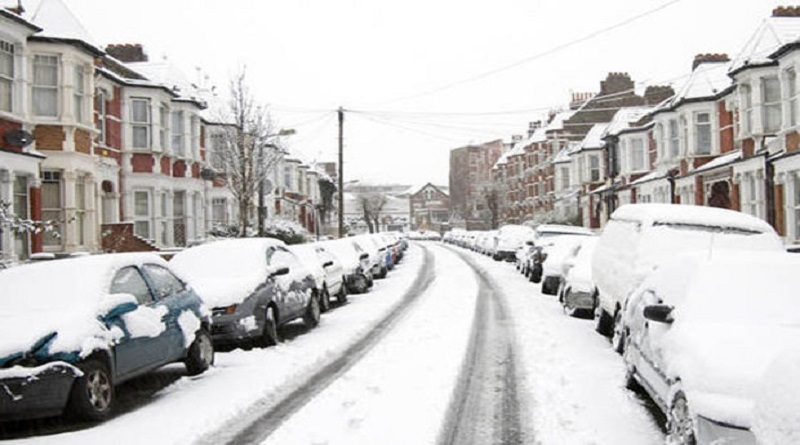WHO warns, Army engaged as 10 die in UK snow storm
Snow storms shut most of Ireland on Friday and forced Britain to call in the army to battle some of the worst weather seen in nearly 30 years.
After a blast of Siberian weather dubbed “the beast from the east”, southern Britain and Ireland were battered by Storm Emma which blocked roads, grounded planes and stopped trains.
At least 24,000 homes and businesses in Ireland were left without power, the stock exchange was shut, all schools were closed and transport ground to a halt with all flights cancelled from Dublin airport.
In Britain, death toll from the storms rose to 10 after a seven-year-old girl was killed in Cornwall after a car crashed into a house in icy conditions, the BBC reported.
Dozens of passengers were stranded on trains overnight in southern England.
The army was called in to help rescue hundreds of drivers stuck in the snow and to transport National Health Service workers.
Roads were closed, schools shut and flights cancelled across Britain.
“The Armed Forces are assisting emergency services in ensuring essential NHS staffs are able to get to work and carry out their work in local communities,” a spokesman for the Ministry of Defence said.
The army is “standing by to help the Police and civil authorities across the UK following heavy snowfall.
“We are also aware of Armed Forces personnel volunteering in their own time with their own vehicles to help those in need.”
Similarly, the World Health Organisation on Wednesday warned that a wave of cold weather hitting Europe this week poses health risks, particularly to people in vulnerable situations, WHO/Europe experts warn. Temperatures are expected to plunge below average in western European Russia, central Europe, the Balkans and the Baltic States.
“Cold, even in places where the temperatures are not at their lowest, can be harmful to people’s health in many ways. It can aggravate existing conditions and raise the risk of increased blood pressure, heart attacks and strokes. Taking preventive action can help reduce the health impacts and risks,” says Dr Zsuzsanna Jakab, WHO Regional Director for Europe. “WHO is carefully following the situation in countries of the European Region. Affected countries should stay alert. Measures must be taken to protect people at risk.”
Cold weather increases the risk of cardiovascular and respiratory disease. Anyone can be affected by cold temperatures at home, at work, while commuting or during leisure activities. Those most at risk of cold-related illness include elderly people, children, and people who have chronic diseases or physical or mental limitations. People taking certain medications or those who are malnourished are also at greater risk of cold-related illnesses.
Frequently, poor households are the hardest hit as the poor can least afford to adequately heat their homes. Homeless people, and refugees and migrants can be especially vulnerable. Their risk increases if they lack adequate shelter, proper clothing, food and medical care.
Health and social services often face the challenge of caring for an increased number of patients suffering from various cold-related illnesses. Disruptions in services and infrastructure can further indirectly aggravate the health effects.
Extreme weather, including cold waves, are common in countries of the WHO European Region and are expected to occur more frequently and severely as a result of global climate change.
Severe cold weather spells are especially common in eastern European countries, where 28 people per million died as a result of extreme cold events in 1991–2015.
Adverse health effects of cold weather are also costly to health-care systems: in 2009 the United Kingdom’s Department of Health estimated that annual costs to the National Health Service of treating winter-related diseases amounted to around £859 million.
A global study conducted by the London School of Hygiene and Tropical Medicine has shown that moderate cold caused more deaths than moderate heat.
Many cold-related deaths actually occur on moderately cold days.
Deaths associated with cold weather are caused by coronary heart disease, cerebrovascular incidents, respiratory diseases, hypothermia and trauma.
Illnesses associated with cold temperatures include: injuries from falls and accidents, hypothermia, cardiovascular problems, respiratory problems, mental health issues including depression, etc.
The adverse health effects of cold weather are largely preventable. “Governments need timely warnings and solid evidence to better protect people from adverse environmental conditions – and our experts in the Bonn Centre are key partners in ensuring this,” says Dr Elizabet Paunovic, Head of the WHO European Centre for Environment and Health, Bonn, Germany. “Our team provides evidence-based solutions to global challenges affecting the environment, such as on climate change, air pollution, safe water and sanitation, industrial contamination and many others.”
The Bonn Centre is becoming a more important stakeholder in health as we see more adverse environmental conditions which impact on health, such as these cold spells, which are one of the results of climate change. “In cases of extreme adverse environmental conditions, the Bonn Centre has a mandate not only to assist governments to protect their nationals but also to reach out directly to the public through the media, to better inform and hence ensure that the public are well prepared and protected,” adds Dr Paunovic.
The Bonn Centre has developed a set of health recommendations related to cold weather in the following areas: Adverse health effects of exposure to cold; what the public can do in preparation for, and during cold weather; what health and social services can do and what general practitioners can do.




